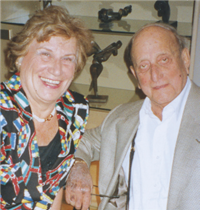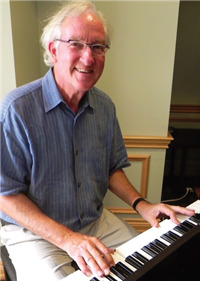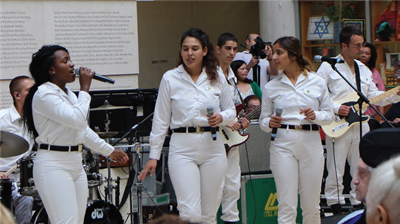Baycrest is celebrating its 100th anniversary. The organization got its start when members of the community raised funds to create the original Toronto Jewish Old Folks Home in 1918. Over the years, it grew to include the Apotex Centre, Jewish Home for the Aged, a large geriatric hospital, the Rotman Research Institute, assisted living home and a centre for education that trains more than 1,100 students a year. All these decades later, donors are imbued with the same spirit of generosity and dedication to making Baycrest a better place and a world leader in the brain health and aging sector. Here are few projects and programs that are making a difference:
VIRTUAL WINDOW INTO THE HOME
Baycrest is making inroads into the future of healthcare for older adults with a range of innovations. For example, videoconferencing technologies are harnessed to provide an extra level of service to older adults in the community.
In the past, a geriatrician would complete a comprehensive assessment in a patient’s home and make recommendations that required follow-up. A gift from
Gabi Weisfeld has allowed Baycrest to purchase new laptops, webcams, a stethoscope with a computer hookup and other equipment, as well as hire a telemedicine nurse for these follow-ups and other virtual visits. The nurse arranges a video call in the patient’s home with the geriatrician who is at the office and can see how the patient is progressing with treatment and recommend next steps.
 Gabi and Louis Weisfeld
Gabi and Louis Weisfeld
The technology is also useful in assessing the home environments of outpatients. “When patients came to see us in the day treatment centre, we used to wonder ‘Did they fall because it is hard for them to get out of bed?’ or ‘Are they remembering to buy groceries?’” said clinical manager Jagger Smith.
Patients are trained to use a videoconference device and display parts of the home that the clinicians want to see. With a virtual window into the home, the team has been able to make simple but powerful changes. One woman couldn’t get in and out of bed safely because the bed was on the floor. The social worker found her a bed frame. A look into the fridge of another patient found that it was almost empty. The team made arrangements with the patient’s family to establish a meal routine. The technology has also been used to grant a hospital patient’s dying wish. The man wanted to see his home one last time but was too ill to make the visit. With the patient’s permission, the outreach team used videoconferencing equipment to provide a tour of his home.
REDUCING UNNECCESSARY HOSPITAL VISITS
The Ontario Ministry of Health and Long-Term Care says that on average, 30 per cent of visits to emergency from long-term care homes are potentially avoidable. The consequences to elders transferred from a longterm care home can be especially dire – they can face long waits before they receive attention and risk further illness from prolonged exposure to other sick patients in the waiting room.
That’s why Baycrest’s Apotex Centre, Jewish Home for the Aged, the largest long-term care home in Ontario, is making a determined effort to reduce unnecessary hospital visits for our 472 residents.
With generous support from the
Menkes Family, Baycrest has created the Acute Care and Emergency Review (ACER). The ACER team meets regularly to review every transfer to emergency to determine if it could have been averted and to develop strategies to quickly spot and address changes in condition on site if appropriate.
Dr. Sid Feldman, Executive Medical Director, Residential Program, Baycrest & Medical Director, Apotex, says the health of an older adult can destabilize quickly. “What we’re trying to do is see if we can anticipate earlier in the trajectory when people are starting to deteriorate so we can intervene sooner,” he said.
New protocols are being established. For example, staff have received training so they are skilled in treating someone having chest pains or a seizure. Residents also have individualized falls prevention programs, and Personal Support Workers (PSWs) are utilizing a “Stop & Watch” tool and “Purposeful Rounding” to identify and precisely communicate subtle changes in a resident’s condition to the nurse by using a clear and structured format.
THE POWER OF MUSIC
Music plays an important role in holistic care at Baycrest because it sparks memories and adds to a sense of wellbeing for residents and patients who have multiple health concerns and/or dementia. Concerts attract not only clients of Baycrest, but also visitors and family members who come for the opportunity to socialize and visit with loved ones in an entertaining, non-clinical setting.
 Hugh Furneaux
Hugh Furneaux
For many years, these concerts have filled the Winter Garden at the Apotex Centre, Jewish Home for the Aged, with the sound of music. Residents, hospital patients and their family members often say the concerts are engaging, brighten their spirits and are the highlight of their day or week.
The Hugh Furneauxsponsored concert takes place every Sunday at 2 p.m., and the
Tauba and Sol Spiro-sponsored concert takes place Thursdays at 3 p.m.
Concerts at Baycrest wouldn’t exist without support from these generous donors. Thanks to their example, many other families have been inspired to sponsor individual dates to honour their loved ones. Funding pays for the guest entertainers; maintaining the sound system; IT support; security; and therapeutic recreation staff to organize the concerts, take care of logistics and patient safety.
 Performers at a recent Baycrest concert
Donor support for these and other important initiatives is vital to Baycrest’s efforts to continue improving the care and well-being of older adults.
Performers at a recent Baycrest concert
Donor support for these and other important initiatives is vital to Baycrest’s efforts to continue improving the care and well-being of older adults.
To find out how you can impact the lives of older adults, visit
baycrestfoundation.org.